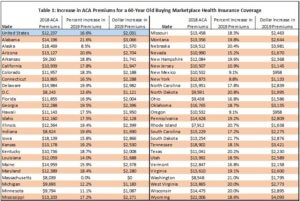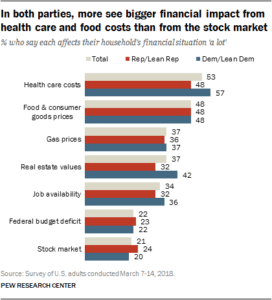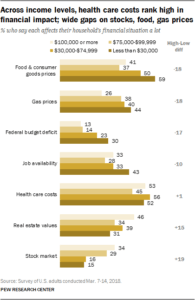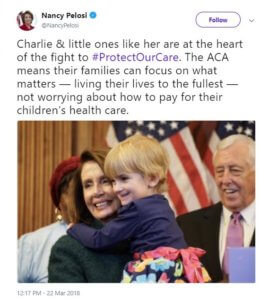While much of Washington focused on the omnibus bill, the Trump Administration and Congressional Republicans continued their unprecedented assault on the American health care system this week. Here’s what happened this week in the GOP’s war on health care – and how as we approach the eighth anniversary of the Affordable Care Act being signed into law, the health care protections it provides Americans are more popular than ever.
GOP PRIORITIZES PARTISANSHIP OVER AMERICANS’ HEALTH, AGAIN…
Congressional Republican leaders left the bipartisan negotiating table and unilaterally released a “stabilization” bill riddled with poison pills designed to prevent Democrats from supporting its passage. The bill includes expansive anti-abortion language which effectively bans all private insurance from covering abortion services, and prevents states from taking action against the Trump Administration’s proposed junk insurance plans that can deny coverage for pre-existing conditions and refuse to cover essential benefits.
Once again, Republicans chose to prioritize an extreme agenda over their constituents’ interests, continuing to go after pre-existing condition protections and women’s health while artificially inflating rates through their relentless sabotage of our care. As Rep. Tom Cole (R-OK) said, “Nobody in that room voted for Obamacare, so the idea you’re going to vote for billions of dollars to stabilize a system you never supported in the first place — pretty hard to choke down.”
…TO OFFER A SHAM STABILIZATION BILL
And what of the bill itself? Alexander-Collins is simply a terrible proposal for Americans’ health care. The proposed GOP stabilization legislation would result in net coverage losses, higher out-of-pocket costs, and fewer coverage options for many Americans – and an attack on a women’s right to choose.
So despite what Republicans may be publicly saying, Alexander-Collins is not a serious attempt to stabilize the marketplaces. It’s a partisan bill designed to fail, and it represents nothing more politics at its worst from Republican leaders in Congress who otherwise have voted to repeal Americans’ health care.
CONFIRMED: TRUMP’S JUNK PLAN RULE HARMS OLDER AMERICANS
According to a new study from AARP, the Trump Administration’s plot to let insurance companies sell junk plans would cause premiums for older Americans to jump by double digits next year, with the average 60-year-old paying an average of 16.6% more for individual-market coverage. If the proposal moves forward, older Americans would face an eye-popping annual premium increase of over $2,000 next year. Here are full state-by-state estimates:

WHITE HOUSE CONTINUES IGNORING REAL OPIOID SOLUTIONS
On Tuesday, President Trump spoke in New Hampshire about the opioid crisis. Once again, his speech was heavy with rhetoric and short on solutions – more of the same from a White House more committed to politicizing the opioid crisis than ending it.
As a reminder, the Trump Administration has relentlessly attacked and sabotaged Medicaid, proposing to cut funding by hundreds of billions for the program that pays for one-fifth of all substance abuse treatment nationwide, and for two successive years has proposed a 95% cut to the Office of National Drug Control Policy, charged with coordinating the federal response to the nation’s raging opioid crisis.
HELLER RECEIVES HIS PAYOFF
Last summer, Senator Dean Heller (R-NV) supported the GOP’s repeal legislation, a bill he himself said ““takes insurance from tens of millions of Americans and hundreds of thousands of Nevadans.” This came just weeks after President Trump threatened Heller, sayings, “He wants to remain a senator, doesn’t he?” As CNN noted:
The subtle threat may have had an effect. Over the next several months, Heller aligned himself closely with the President, endorsing his efforts to repeal Obamacare, appearing right behind Trump at a White House event celebrating passage of the tax law, and avoiding direct criticism of Trump despite the seemingly endless string of controversies coming out of the West Wing.
This week, Sen. Heller received his final payoff: a tweet from President Trump.
Congrats to Sen. Heller! But he might want to take that endorsement with a grain of salt, because…
POLLING SHOWS: HEALTH CARE A TOP ISSUE, VOTERS BACKING PRO-ACA CANDIDATES
This week, Public Policy Polling released a series of polls which found that not only is health care a top issue for voters across the country, but voters are rejecting pro-repeal candidates in five battleground states. The polls found the following results:
- In Arizona, health care is a top issue for 68% of voters, with 21% saying it is the most important issue. In a hypothetical Senate election, Democrat Kyrsten Sinema leads Republica Martha McSally 46-41
- In Nevada, health care is a top issue for 65% of voters, with 27% saying it is the most important issue. In a hypothetical Senate election, Democrat Jacky Rosen leads Republican Dean Heller 44-39.
- In Pennsylvania, health care is a top issue for 71% of voters, with 25% saying it is the most important issue. In a hypothetical Senate election, Democrat Bob Casey leads Republican Lou Barletta 54-36.
- In Tennessee, health care is a top issue for 71% of voters, with 31% saying it is the most important issue. In a hypothetical Senate election, Democrat Phil Bredesen leads Republican Marsha Blackburn 46-41.
- In Wisconsin, health care is a top issue for 72% of voters, with 25% saying it is the most important issue. In a hypothetical Senate election, Democrat Tammy Baldwin leads Republicans Leah Vukmir and Kevin Nicholson 51-39 and 51-38, respectively.
POLLING ALSO SHOWS: HEALTH CARE THE #1 POCKETBOOK ISSUE FOR AMERICAN FAMILIES
Today, the Pew Research Center released a new survey that finds the number-one pocketbook issue for Americans of all income brackets is health care, confirming the vital importance of this issue to American families. Key findings include:
- More than half of those surveyed said that health care affects their household’s financial situation “a lot,” the only issue which more than half of Americans rated a key economic issue.

- Health care is “a top household financial issue” across all income levels, with 53% of those earning more than $100,000 and 52% of those earning $30,000 or less saying it has a large effect.

THE ACA TURNS EIGHT, AND IS MORE POPULAR THAN EVER
Finally, today March 23, is the eight-year anniversary of the Affordable Care Act being signed into law. Since then, more than 20 million Americans have gained coverage; the uninsured rate fell to below 9 percent, the lowest-ever recorded rate; and health care prices rose at the slowest rate in more than half a century.
Yesterday morning, Leader Nancy Pelosi, Whip Steny Hoyer, Assistant Minority Leader Jim Clyburn, Rep. David Cicilline, and Rep. Brenda Lawrence joined Protect Our Care, Little Lobbyists, Health Care Voter, Doctors for America, and other health care advocates at a press conference celebrating the millions of lives which have benefited since the ACA was signed into law.

While there is countless work ahead, hundreds of millions of Americans are able to sleep easier at night knowing that insurers can no longer pick and choose who to cover, protecting from discrimination against those with pre-existing conditions, removing lifetime caps, and mandating essential coverage like maternity care and cancer treatment.
Today, the Affordable Care Act is more popular than it has ever been.

